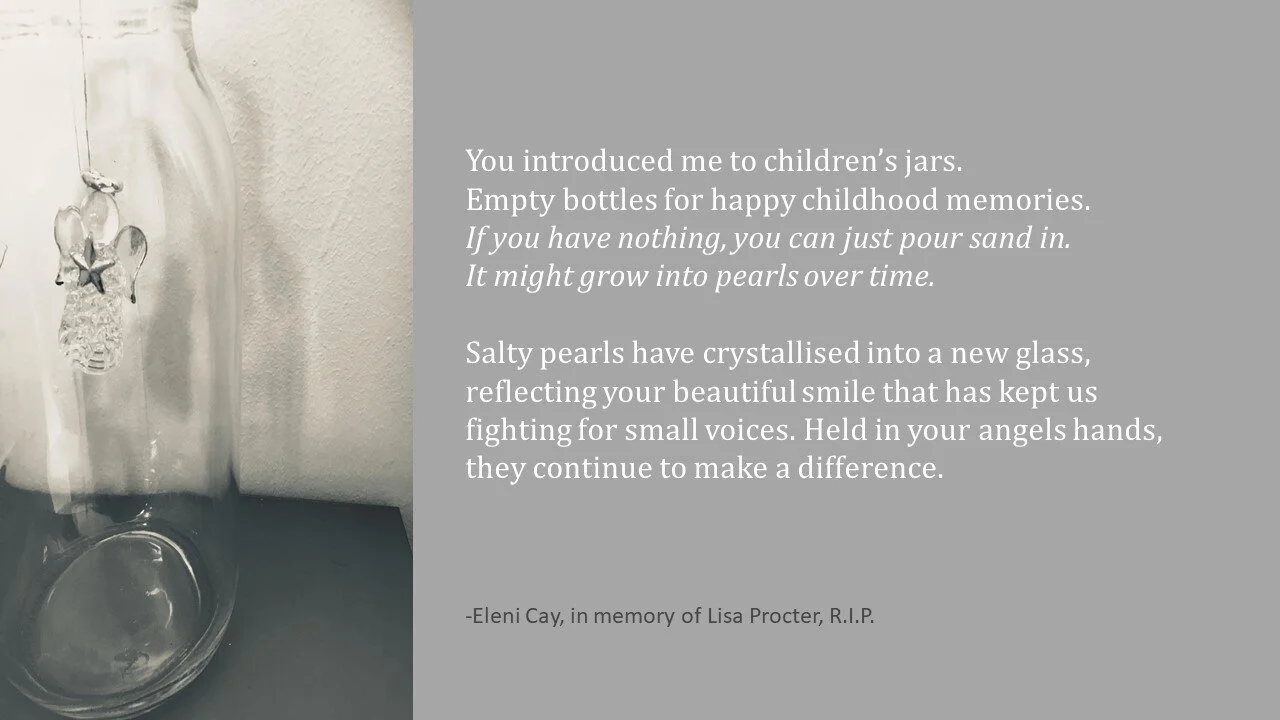Remembering Lisa Procter
Some poems take years to write. Some blogs – like this one – take years to write too. Because no words seem strong enough to do justice to the pain of losing someone. Someone young and beautiful, someone who was full of smiles and ideas for making others’ lives better. Lisa was like that. She sought to create good times, she saw the glass full. She had confidence, courage, skills. She could teach a big class, build rapport with all students, manage colleagues’ expectations. I loved Lisa’s humour, energy, insights. I admired her awesome earrings and extravagant haircuts.
I was the country girl who came to Manchester for a new job. I didn’t know anyone. Lisa was my age, my height, my colour of hair. She showed me some fancy places, she showed me how to shrug off small problems. Lisa and I knew what it was like being employed on short-term contracts, living in temporary accommodations, sacrificing personal life for work. We both worked with childhood studies, explored the role of technologies in children’s lives. There was poetry and art in Lisa’s academic work – a combination I never achieved and very much admired. Lisa had visionary ideas of using audio stories and children’s silences to represent what children felt but couldn’t express in words. I developed an app for children’s story-making and Lisa had ideas for using it in kindergartens for documenting children’s experiences.
That’s how I knew Lisa. That’s how I want you to know Lisa. But when you google her name, you will get the tabloid version of her life. You will read that she was a ‘‘First class high achiever’ university academic, 36, who hanged herself in her new home”. You will read that she “made desperate 2am call to her friend and then killed herself while struggling to get over brutal assault on a Spanish holiday in her 20s”. I am copying the text here because I don’t want you to click on those stories. Because your click will push them one step higher in the search engines. The click-hungry algorithms do not care who you are, who Lisa was. Not even the deceased can control their narrative in search engines. The algorithms slice the truth to feed greed. To force twisted narratives against the will of silent voices.
No one writes about inequality of voices more profoundly and more eloquently than Rebecca Solnit. Her books about feminism, and other human rights movements, should be on everyone’s bookshelf. She and other women fighting for justice and democracy of voices help me process my feelings of fear, anger, distress. The fantastic female mentors and colleagues I work with sustain my energy to work for social justice for women, for children, for people from ethnic minorities, for all voices that are not heard.
When I was offered a job in Norway, the first thing I googled was the Norwegian statistics of sexual assault against women. As someone who loves spending time in nature, the possibility to hike on my own, whenever and wherever I wished, was a ticket to freedom. Women reading this blog know what it feels like travelling on their own, checking exists in every hotel room, pushing chairs against the doors when feeling unsafe. One in five women has been sexually assaulted in her life. For men it’s about one in 70.
Lisa’s Twitter account is still alive. Her papers are being cited, her blogs about children’s spatialities are being read, her ideas continue to inspire us.
Lisa’s soul is now in a better place. She sits on a gorgeous white sofa and makes art with children. She laughs as the children’s small hands weave beads into her new dress, and as she collects awards for her contribution to science. There are no demons chasing her in the night, there are no memories she needs to push into black boxes. She is happy. She is who she deserved to be.
